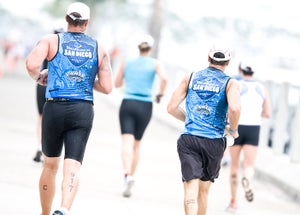Should You Hire A Running Coach?
Runners often hit plateaus in their training. Despite efforts to get faster, they clock in at the same speed and cross the finish line without a PR. If you are at that stage, you may already be contemplating hiring a running coach, but is it worth it?
Elite coach Jim Vance discussed the purpose and benefits of hiring a running coach so you can make an informed decision.
Triathlete.com: What purpose does a running coach serve?

Vance: There are a number of purposes a run coach can serve. A coach can do anything from simply providing technical analysis of the run gait of the athlete to designing training programs that address the weaknesses of the runner, and how to improve those weaknesses towards a performance or goal event. Run training is high-impact, high-risk—so it’s important for athletes to plan their training in a way that keeps them improving and injury-free. I have also helped athletes analyze their training from the past season by reviewing run-training files, with speed and distance info gathered from technical gadgets such as a Garmin or Polar. With this data, we can review what the athletes did right, where they made mistakes, possible injury developments and more.
Triathlete.com: What questions should someone should ask a running coach before hiring him or her?
Vance: What are the athlete’s goals? These are the first and most important things to consider. When athletes specifically know what they want, finding someone to help them with these specific goals becomes easier. Some just want a group to train with; others want specific guidance based on their goals and race schedule. After knowing this, the athlete can address each coach, asking questions such as “How will you help me achieve these goals?”
Triathlete.com: What are the benefits and negatives to training with a running coach in a group?
Vance: The benefits are that you can usually find plenty of people to push you, and probably see some technically excellent runners. Motivation to attend a practice where you’re expected to be is always helpful, and the social aspects make it fun as well. The downside can be that a group may not be training specific to your goals. If the group is doing hard intervals on a track and training for a 5K, and you want to do a marathon, then there is little help the group will provide, and perhaps can cause injury to the athlete.
Triathlete.com: What are the benefits and negatives to training with a running coach one on one?
Vance: An athlete can get specific attention, and real-time feedback and analysis of how they are doing. A coach on-site can also help to make sure the workout goes exactly as planned, with the correct recovery periods, and completing the workout according to the goals. Sometimes a coach can also be the objective voice of reason, and tell an athlete to stop when they clearly are pushing themselves to a point of injury, trying to perhaps finish a workout despite running with a limp or other injury. The negative aspect is that this requires a lot of motivation for the athlete, and because it is one-on-one time, it is usually expensive to hire a coach for that much individual attention.
Triathlete.com: Now you’ve hired the coach and are in training, what feedback should someone be getting from his or her running coach?
Vance: Communication is a two-way street. If the athlete isn’t providing feedback to the coach, it is hard for the coach to give feedback of any value to assess the training. One of the big things I do is ask that all my athletes give me the data from a device, which helps me see objectively how the athletes are progressing in their training. I also ask for feedback on the mental side, and see how they are perceiving the training, if any nicks or injuries are starting to develop, etc. This allows me to adjust the training as well.
Triathlete.com: What is the most important tip you could give someone looking to hire a running coach?
Vance: Have a long-term approach, and trust them enough to follow what they tell you. If you aren’t willing to be flexible in your approach to the training, then no coach will be successful working with you. A lot of athletes think they want a coach, but as soon as a coach has them break away from what they’re used to doing, they rebel and want to stick with what they’re used to, even though they are frustrated with the results. It’s almost like they are afraid of change, and simply want to get better results off past, ineffective training methods. If you want to really maximize your learning, trust them and follow their plan to a T.
Vance is an Elite Coach for Training Bible Coaching, Level 2 USAT certified and former elite triathlete. He also started a junior tri program, Tri Juniors, focused on draft-legal racing. He is based in San Diego, Calif. He is a former four-year letter winner in track and cross country for the University of Nebraska. You can follow his coaching blog at CoachVance.blogspot.com.